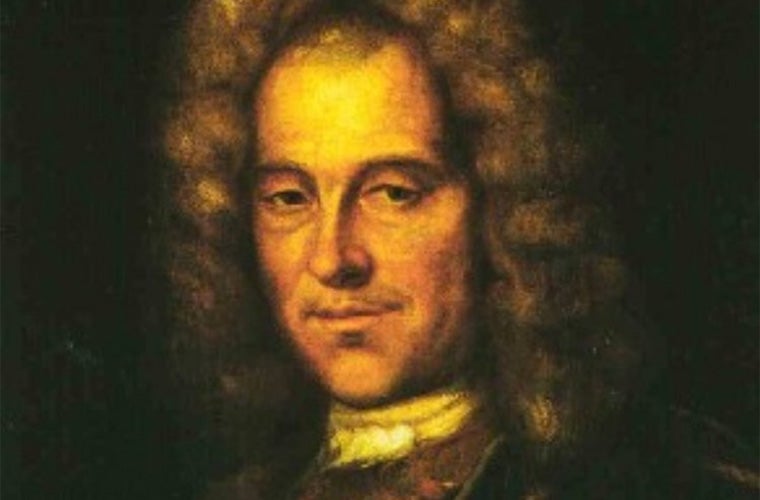
Jan Dismas Zelenka
1679 - 1745
Biography
The Dresden court attracted many foreign musicians under Heinrich Schütz, who developed a chapel of international repute during his long term of office as court Capellmeister from 1617 to 1672. In the early 1700s, composers, impresarios, famous singers, and instrumental virtuosos came from all over Europe, including the eastern countries, and Dresden's display of splendor as the "Florence on the Elbe," the predominant center of music and the arts in 17th- and 18th-century Germany, reached its zenith during the reign of Augustus the Strong (1670-1733) as Elector of Saxony and King of Poland.
Born in Loudovice, Bohemia in 1679 and son of an organist, Jan Dismas Zelenka was educated at the Prague Jesuit College, with which he continued to remain in contact. In 1710, he moved to Dresden, where he became principal double-bass player of the Dresden court orchestra. Apart from specific journies to Italy, Vienna and periodic returns to Prague, Zelenka would remain in Dresden for the rest of his life.
In 1697, the King-Elector Augustus the Strong of Saxony had assumed the Polish crown, a step that obliged him to adopt the Roman Catholic faith although Saxony was predominantly Lutheran. Thus the Royal Court at Dresden maintained two religious "faces", on the one hand honoring strictly Lutheran Bach with the title of Royal Court Composer, and on the other hand bestowing on Zelenka the title of Court Composer of Church Music for his numerous sacred works composed for the Dresden Catholic Church. So we find in Zelenka's surviving compositions numerous sacred works, some 30 masses, psalms, and three oratorios with biblical subjects, totaling in all some 150 works, side by side with secular instrumental compositions reflecting his role in the Court Orchestra, of which he became conductor for five seasons.
From 1716 to 1719 Zelenka traveled to Italy, where he may have encountered Antonio Lotti and Alessandro Scarlatti. He also spent time in Vienna where he studied counterpoint with Johann Josef Fux, most probably composing his Capriccios there. During these years, he gathered a sizable study collection of works written in strict contrapuntal style which still survives in the Saxon State Library. In 1719 Zelenka returned to Dresden, taking up once more his position in the Court Orchestra and resuming his sacred compositions.
1723 was a particularly significant year for Zelenka. In this year the coronation took place in Prague of the Emperor Charles VI, for which occasion the Jesuits had commissioned Zelenka to compose suitably festive music. Monarchs and princes from all the surrounding territories converged on Prague for the occasion, bringing their retinues and orchestras with them. Zelenka conducted his own composition, the solo parts being sung by Czech noblemen. It was a glittering occasion, perhaps the high point of Zelenka's career.
Thereafter his life in Dresden continued uneventfully, with further sacred compositions, some commissions from Bohemian noblemen, and no doubt though undocumented, occasional visits to Prague. It was during the 1730s that he received his royal title of Church Music Composer, and he was well paid at Court. Bach too, based in nearby Leipzig and a frequent visitor to Dresden, was also awarded a Court Title at this time. A well-known and greatly respected visitor to Dresden, Bach was undoubtedly on familiar terms with all the musicians and musical personalities of Dresden, including Zelenka. Bach would often take his son Wilhelm Friedemann with him on his visits to Dresden; Bach in fact instructed his son to copy one of Zelenka's works – the Amen from his Magnificat – for use in Leipzig at St Thomas'.
Zelenka's music is always fresh and creative. His instrumental works often surprise the listener with sudden turns of harmony, and performers are often challenged by demanding instrumentation. His choral works bear no relationship with those of Bach – indeed the two composers were writing for different religious traditions and idioms. Zelenka's choral works are difficult to place in time; in his eclectic mix of drama, counterpoint and depth of feeling one could almost be listening to a Schubert Mass. Here again as in his instrumental works, listeners should expect the unexpected.
Zelenka died in Dresden on December 23rd, 1745. Though some of his work has been lost over the years, and much was destroyed in Dresden during the last years of WWII, many copies were fortunately preserved in Prague. It was only during the last decades of the 1900s that Zelenka was truly "discovered", and unlike many "undiscovered treasures of the baroque" which might better have been left undiscovered, Zelenka's music undoubtedly rewards further exploration. In summary one might justifiably say of his compositional output, both instrumental and sacred, that it puts a fresh face on baroque music.